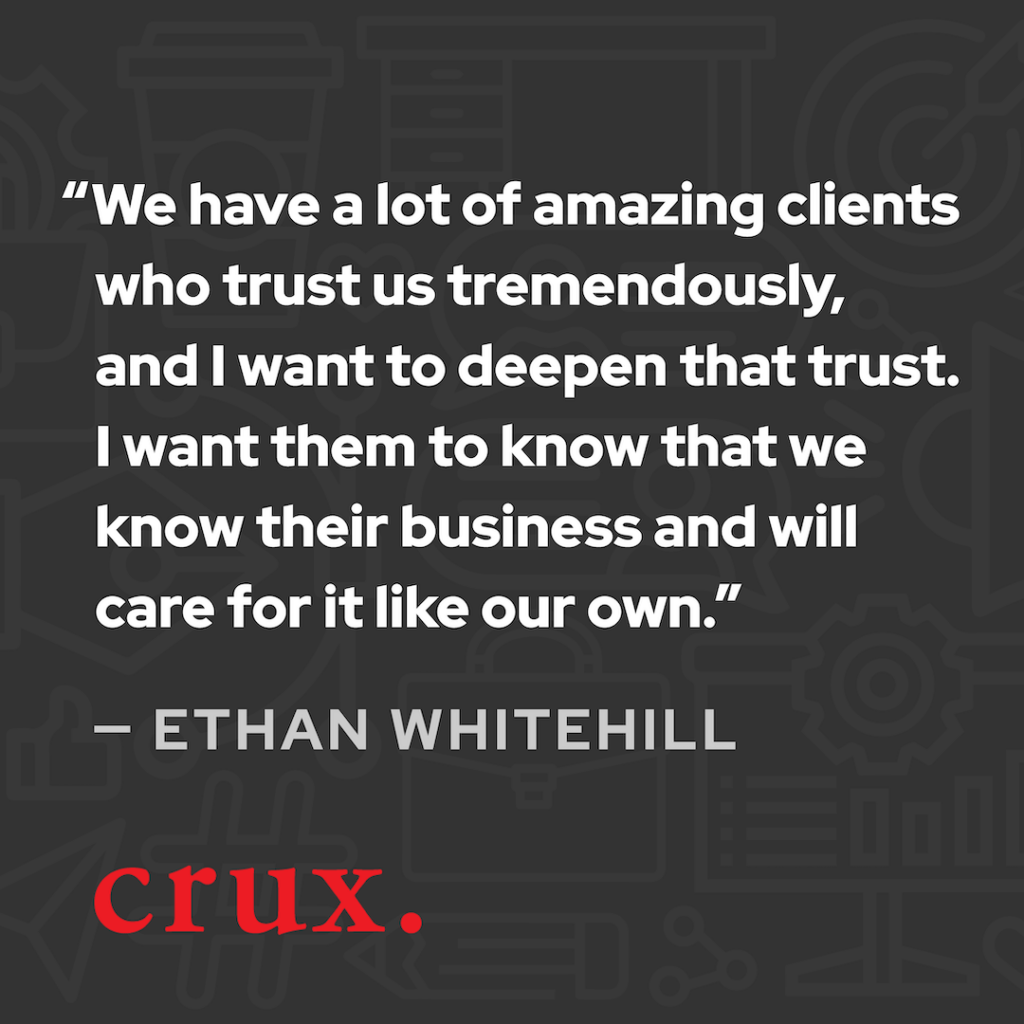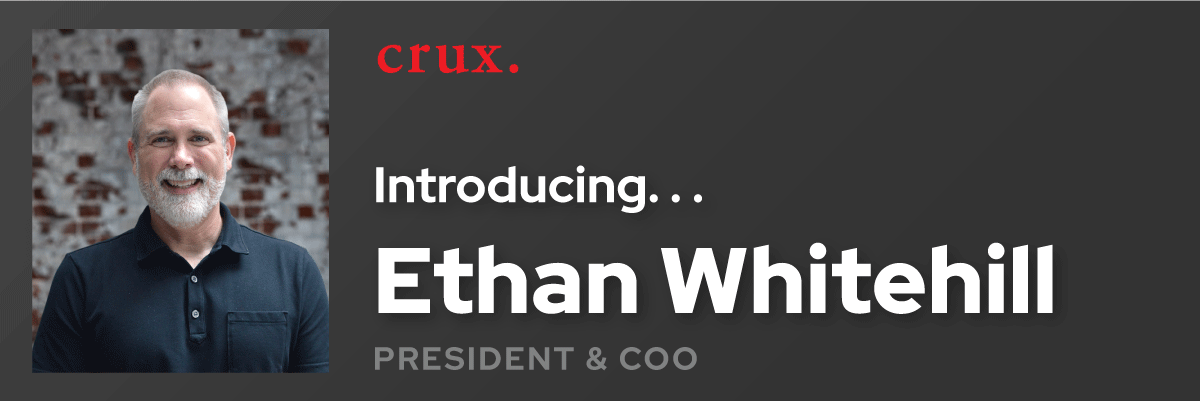Earlier this summer, Crux proudly welcomed Ethan Whitehill into the fold as president & chief operating officer. Ethan has made a career out of building agencies and growing brands. He founded the firm Two West in 1997, running it as an independent shop for nearly 20 years before selling to Sandbox and later combining with MERGE, where he served as CMO. Ethan’s worked on a host of diverse brands and has been lauded for his entrepreneurship, leadership, innovation and industry expertise. Our team recently sat down with him to learn more about his marketing expertise, where he believes the industry is headed and his vision for Crux. Read what Ethan shared with us, below.
When I graduated, I started working as a copywriter at what is now MMGY, but then followed my mentor, an in-house writer at Ferrellgas, where I eventually served as a Creative Services Supervisor. I got a lot of great experience working in-house, which helped me understand business from the inside out. That’s when I took the opportunity to go for my MBA. Throughout all of that, I was freelance writing on the side for several great Kansas City brands. That experience helped me see there was an opportunity to build a creative agency serving similar clients. I hatched a plan with my production manager at the time, and we formed what we thought was just going to be a couple of freelancers sharing space in a loft, but ultimately became a full-service agency that lasted for almost 20 years.
Exactly, Two West was a shopper marketing and retail agency. As we witnessed digital marketing rise to prominence in the customer journey, we saw more opportunities upstream and downstream of the store experience—our specialty—but we weren’t built in a way that could handle that business. I knew it was either time for us to buy somebody or to be sold to somebody to bring those capabilities together. We sold to Sandbox, where I became a general manager, overseeing about half of their business, including my legacy team. Sandbox eventually sold to MERGE, where I was part of the management team responsible for integrating the acquisition. I continued with MERGE as their chief marketing officer for about a year and a half after that. It was exciting to work at that scale, bringing what I’ve learned over the course of my career to a private-equity-backed, top-100 agency. After a while I realized it was time to get back to my roots and do what I really love, which led me to Crux.
I set a goal for myself to reevaluate my life when I turned 50. So, when that time came, everything just collided. I was thinking about consulting and doing fractional CMO work. While I was networking, I reached out to Two West’s former banker, Grant Burcham. And when I talked to him, he said, “You know, I’ve got somebody you should meet.” That person was Melea. She was at a stage in her growth where she needed someone with the operational knowledge to grow the agency and take it to the next level. We were totally simpatico on the kind of firm she wanted to build and the kind of culture she wanted to inspire. It spoke to me, and it reminded me a lot of the company I built. It felt like I was returning home in a way. It’s funny. Some of the connections across Melea, Grant and I get pretty uncanny. For starters, we have each led businesses that at some point made the Greater Kansas City Chamber’s Top 10 Small Businesses list. And all three of us have been involved with the Helzberg Entrepreneurial Mentoring Program at different stages of our careers.
I love that they’re at a tipping point. If you think about a growth curve, there’s usually an early, easy slope that’s rising, but not dramatically. Then there’s that inflection point when you do one thing that’s game-changing to the business, and the trajectory turns vertical. I love helping businesses navigate that pivot to growth. Beyond that, I’m thrilled to return to my Kansas City network. I place a lot of importance on the value of my network and in my long-time community relationships. An agency that’s able to retain clients and partners for the long haul is incredibly special. There are many agencies that can win business and churn through it, but their growth is constant churn. That’s actually the majority of agencies, and it’s an easy path to take. It’s far more difficult to keep a client for the long-term and be there in the ups and downs alongside them.
Number one is very simply building a foundation for growth and making sure we’ve got the systems and processes in place to scale. Number two is to elevate our capabilities by taking our people to the next level. It’s my job to create an environment where they can be successful. Number three, I think, is creating a lighthouse brand for Crux. It’s turning all that we’re doing with our culture and our structure into a beacon to attract great clients and great talent.

I hope clients see I’m adding value to their business. I want them to feel the difference in our team, in our capabilities, in our client experience. We have a lot of amazing clients who trust us tremendously, and I want to deepen that trust. I want them to know that we know their business and will care for it like our own. That’s really the promise of our model: in-house marketing, outsourced.
I love big ideas, and I think I’m wired to be an entrepreneur. I love seeing a need, taking risks and developing big ideas to solve problems. Even before I understood what marketing was, I knew I wanted to have my own business, and marketing allows me to play in the sandbox with lots of entrepreneurs. Marketing is my enabler. It allows me to immerse myself in an array of industries and businesses, and learn new things every day. The writer in me is also driven by storytelling. Great brands have great narratives, and my favorite career moments tie back to helping entrepreneurs tell their company story and create their brand.
Well, there are three things: Believing, belonging and becoming. The first is all about giving people a reason to believe in a brand and what that brand stands for. In other words, you have to create trust in something meaningful. Then, you must give your customers a sense that they belong to something bigger than themselves. Everyone wants to be part of a community. And last, for the trifecta, your brand should connect with people’s desire to become something more. Great brands actualize aspirations.
I’m good at creating environments where people can succeed and thrive, and that often starts with building a story from the inside out. I enjoy helping clients articulate their brand in a way that’s meaningful to employees, so they can create a resilient, living brand. If you get your culture right, your business will be unstoppable.
I think the big agency model will always work for some, but it’ll work for fewer and fewer. Industry consolidation and talent commoditization are leading to marketing mass-production and transactional client relationships. That just doesn’t fit with so many small- and medium-size businesses, entrepreneurs and intrapreneurs, who need a nimble partner who can help them challenge the paradigm and disrupt their industry. There is space for Crux’s un-agency model. We’re not an agency, we’re not in-house, we’re not outsourced – we’re something different, and we fill a rapidly growing gap.
